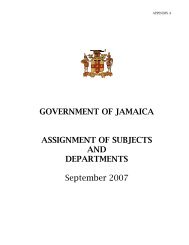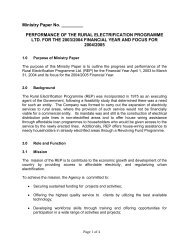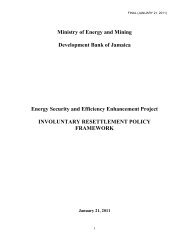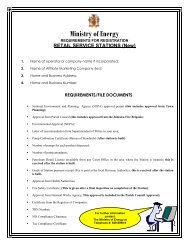Jamaica Biofuels Report - Ministry of Energy
Jamaica Biofuels Report - Ministry of Energy
Jamaica Biofuels Report - Ministry of Energy
Create successful ePaper yourself
Turn your PDF publications into a flip-book with our unique Google optimized e-Paper software.
farmers and Midwestern states, whereas the opposition is led by environmental groups andothers who see the program as uneconomical for one reason or another.The practical significance for <strong>Jamaica</strong> is that as a member <strong>of</strong> the Caribbean Basin Initiative, thecountry can take advantage <strong>of</strong> the credit without <strong>of</strong>fsetting tariffs, but the future <strong>of</strong> the credit ishighly uncertain and probably would entail significant risk for an investor who relied on it. Onthe other hand, a renewable fuel standard established by the <strong>Energy</strong> Independence andSecurity Act <strong>of</strong> 2007 requires 12.95 billion gallons from renewable sources in 2010, increasingto 36 billion gallons per year by 2022. Greenhouse gas and other environmental criteria mayfavor cane-derived ethanol over other sources.European UnionIn the EU both ethanol and biodiesel receive government financial support in almost allmember states predominantly in the form <strong>of</strong> reduced fuel excise taxes for bi<strong>of</strong>uels. A recentstudy 10 concludes that EU governments spent $4.8 billion in 2006 to support bi<strong>of</strong>uels in aneffort to reduce reliance on oil. By 2008 the financial support dropped to $3.9 billion on 1.68billion gallons <strong>of</strong> produced ethanol and 2.33 billion gallons <strong>of</strong> produced biodiesel because excisetaxes on bi<strong>of</strong>uels were raised as mandatory bi<strong>of</strong>uels blending policy gained popularity. Thisgovernment support translates to $3.64/gal for ethanol and $2.46/gal for biodiesel (calculatedat an exchange rate <strong>of</strong> $1.30 per euro).Interestingly, the same study makes the following recommendations to European policymakers:Institute a “polluter pays” principle, a form <strong>of</strong> carbon tax, to account for the consequences <strong>of</strong>fossil fuel use;Phase out bi<strong>of</strong>uels support except for research and development (R&D) programs;Eliminate tariffs on imported fuel ethanol;Implement transparency concerning EU member states' bi<strong>of</strong>uels policies to allow properevaluation <strong>of</strong> their support measures.AustraliaIn 2001 Australia set a production target (but not a mandate) <strong>of</strong> 350M liters per year (92 mgy)<strong>of</strong> bi<strong>of</strong>uels by 2010. The country has so far assisted bi<strong>of</strong>uels prices mainly through an excise taxrebate <strong>of</strong> $1.34/gal to producers (calculated at an exchange rate <strong>of</strong> A$1.07 per US$). Thesubsidy is provided to domestically produced ethanol and biodiesel, as well as – surprisingly –to imported biodiesel, but not to imported ethanol. As a result, bi<strong>of</strong>uels will enjoy an excisetax-free status until June 30, 2011. Subsequently, the taxes will progressively rise to 50% <strong>of</strong> thelevel <strong>of</strong> those imposed on gasoline and diesel by 2015-16 on an energy equivalent basis.10 Jung, A. et al., “<strong>Bi<strong>of</strong>uels</strong> – At What Cost? Government support for ethanol and biodiesel in the European Union –2010 Update”, International Institute for Sustainable Development, Geneva, Switzerland, July 2010.31










